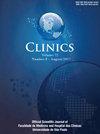拉丁美洲最大的综合医院的医疗行为和身体活动咨询知识
IF 2.4
4区 医学
Q2 MEDICINE, GENERAL & INTERNAL
引用次数: 0
摘要
目的了解某大型三级医院心理咨询的实践和知识。设计横断面观察性研究。参与者和在大学医院积极从事医疗实践的医生被邀请参与一项在线调查。干预:一份旨在获取医疗培训、生活习惯和PA知识信息的问卷。主要结果测量:久坐行为、临床实践和自我效能通过李克特问题进行评估,而常规实践、以前的培训和PA知识通过二分法进行评估(答案:“是或否”或“对或错”)。结果有效率为11.5%(50.6%为女性,44.9±12.8岁),67.7%为体力活动,63.3%为4 ~ 8小时/天的久坐行为。只有40.7%的人接受过PA培训,99.7%的人认识到推荐PA的重要性,但只有一小部分(48.4%)的人在所有咨询中推荐PA(主要障碍是缺乏专门的培训)。此外,69.2%、58.7%和65.5%的人分别认为他们收集PA病史、评估禁忌症和与患者接触的能力为良好/优秀。对PA的了解程度从低到非常低,正确率从49%到17%不等,低至10%(考虑到儿科人群)。结论虽然医师认识到心理健康咨询的重要性,并对心理健康咨询技能有较高的自我效能感,但很少有医师将心理健康咨询付诸实践。这可能是由于私人护理培训不足和/或三级医院提供的服务复杂所致。目前的结果证实,需要改进医疗培训的PA。本文章由计算机程序翻译,如有差异,请以英文原文为准。
Medical conduct and knowledge about physical activity counseling in the largest hospital complex in Latin America
Objective
To characterize practices and knowledge regarding PA counseling at a large tertiary hospital.
Design
Cross-sectional observational study.
Participants and setting
Physicians with an active medical practice within the university hospital were invited to respond to an online survey.
Interventions
A questionnaire designed to capture information on medical training, life habits and knowledge about PA.
Main outcomes measures
Sedentary behavior, clinical practice and self-efficacy were assessed by Likert-type questions, whereas regular practice, previous training, and knowledge of PA were evaluated through dichotomous questions (answers: “yes or no” or “true or false”).
Results
Response rate was 11.5 % (50.6 % female, 44.9 ± 12.8 years), 67.7 % were physically active, and 63.3 % had 4 to 8 h/day of sedentary behavior. Only 40.7 % had previous training on PA, 99.7 % recognized the importance of recommending PA, but only a small part (48.4 %) recommended PA in all consultations (the main barrier was lack of specific training). In addition, 69.2 %, 58.7 % and 65.5 % rated their abilities to collect PA history, assess contraindications, and engage the patient as good/excellent, respectively. Knowledge of PA was rated as low to very low, with correct answers ranging from 49 % to 17 % and as low as ∼10 % (when considering the pediatric population).
Conclusion
Although physicians recognize the importance of PA counseling and have high perceived self-efficacy in relation to counseling skills, few put them into practice. This may be due to insufficient training on PA and/or the complexity of services provided at the tertiary hospital. The present results corroborate the need for improvements in medical training on PA.
求助全文
通过发布文献求助,成功后即可免费获取论文全文。
去求助
来源期刊

Clinics
医学-医学:内科
CiteScore
4.10
自引率
3.70%
发文量
129
审稿时长
52 days
期刊介绍:
CLINICS is an electronic journal that publishes peer-reviewed articles in continuous flow, of interest to clinicians and researchers in the medical sciences. CLINICS complies with the policies of funding agencies which request or require deposition of the published articles that they fund into publicly available databases. CLINICS supports the position of the International Committee of Medical Journal Editors (ICMJE) on trial registration.
 求助内容:
求助内容: 应助结果提醒方式:
应助结果提醒方式:


